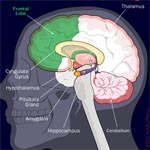How brain controls perception of emotional events
 Washington, Apr 21 : What do emotions mean and how do we retain past events in the mind? Such questions have bugged people for long. Now, scientists have found key processes in the brain that control the emotional significance of experiences and how individuals form memories of them.
Washington, Apr 21 : What do emotions mean and how do we retain past events in the mind? Such questions have bugged people for long. Now, scientists have found key processes in the brain that control the emotional significance of experiences and how individuals form memories of them.
In the study by Nicole Lauzon and Dr. Steven Laviolette of the Schulich School of Medicine & Dentistry at The University of Western Ontario, scientists have claimed that a lack of proper brain function in this area may lead to conditions like Schizophrenia and Post-Traumatic Stress Disorder (PTSD).
In people who suffer from these conditions emotional experiences can become distorted, which in turn causes the person to `lose touch' with reality.
Lauzon discovered that specific receptors for the neurotransmitter dopamine could control how the brain processes emotionally significant information as well as memories for those experiences.
The researchers used a rodent model of emotional learning and memory formation, and increased the activity of a specific dopamine receptor in a region of the brain called the pre-frontal cortex.
They found that the receptor could transform a normally insignificant emotional experience into a very strong emotional memory.
On the other hand, when a different subtype of the dopamine system was activated, it was able to block the ability to recall an emotionally charged experience.
Laviolette said: "Our findings have profound implications for understanding how specific brain receptors can control the magnitude of emotional experience and memory formation.
"Targeting these receptor systems pharmacologically may offer new therapeutic treatments for controlling the emotional perception and memory deficits observed in psychiatric disorders such as Schizophrenia and PTSD."
The findings have been published in The Journal of Neuroscience. (ANI)